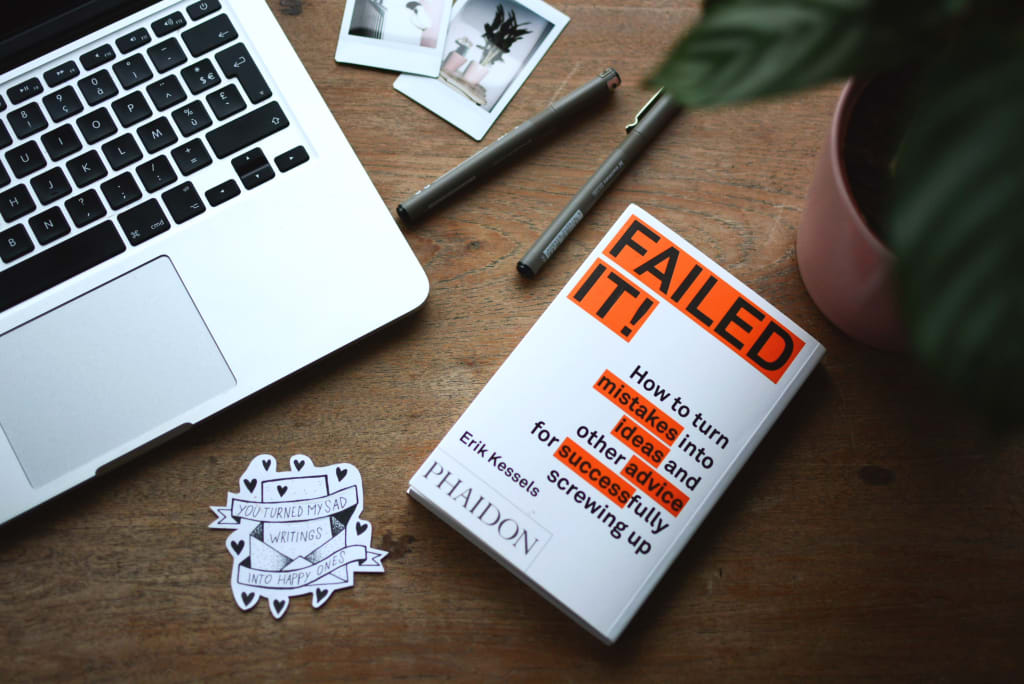Learning How to Be Okay with Failure
And How We Need to Redefine That Word

Over the years I have realized that the biggest person who gets in my way is my own self. My comfort zone has kept me from going out and doing adventurous things that I later regretted not doing. When I try and fail at something it usually ends in me quitting altogether due to sheer embarrassment. Because of this, I have lost opportunities that would have put me on a different path if I had taken them. I am happy with where I am today and don’t necessarily regret my decisions but they have made me learn a huge life truth; failure is not a bad thing.
Failing is just one more step towards succeeding.
Each time we fail at something it takes us down a peg or two. Instead of looking at it as a bad thing, how about we start changing the conversation. Okay, you failed. Ask yourself why you failed and what got you to the point of failure. Now take that information and change it for next time. If you fall again, then you can simply repeat the process. Every time we fail, we give ourselves new information to become better. If scientists gave up each time they failed we would not have half the medicines, cures, and knowledge that we have today.
I completely understand this is easier said than done. It is not easy to pick yourself up after a huge failure and it is even more difficult to see the light at the end of the tunnel. I still have struggles some days with thoughts like, “What am I doing? I’ll never make this into a career.” The problem in this assessment is that I am the only one tearing myself apart. No one else is saying this and if they are it is usually due to insecurities of their own.
A first step in being okay with failure is accepting in your heart that it is okay that you were not successful. Before you even start to pick up the pieces, tell yourself that it is perfectly normal to have fallen in the first place. Look at famous celebrities, writers, scientists, or even close friends for comparison. They did not succeed at something without falling a few times. If anything, you should see this as an accomplishment. You are exactly where people like J.K. Rowling were at one point in their life.
Once you have accepted that it is okay to flop, you can start to analyze the reason you failed in the first place. Use that knowledge to try again. When I first entered a writing contest I didn’t even come close to winning. I thought that was the end of my writing career. I felt defeated and that a dream I held dearly was shattered. It was my family who showed me that I was actually succeeding by that failure because I went out and tried. Yes, I failed, but that meant I knew what it felt like and knew what I needed to change for next time.
When you actually fall it hurts and you go into a slight shock. Afterwards, you pick yourself up, clean your wounds, and keep walking until healed. The next time you fall it might still hurt but you'll know what to expect and how to get back up. This all might sound like a cheesy comparison but it rings great truth. The only time you truly fail at something is when you let that set back make you give up altogether.
Even if you don’t become your idea of ‘successful’, you are still successful in the simple fact that you still strive for better no matter the setbacks. I have never looked at someone who was working towards their dream as ridiculous or stupid. Following a passion or dream is not going to be easy and you are going to fail. Once you realize this it becomes easier to follow through even after those bad days. If it were easy we would have more people living out their dreams instead of just working for that next paycheck.
About the Creator
Ashlyn Harper
A chaotic room of stories. My curiosities lead me in all types of directions, creating a chaotic writing pathway. I want this place to be for experimenting, improving my craft, and sharing new ideas with anyone willing to read them.






Comments
There are no comments for this story
Be the first to respond and start the conversation.